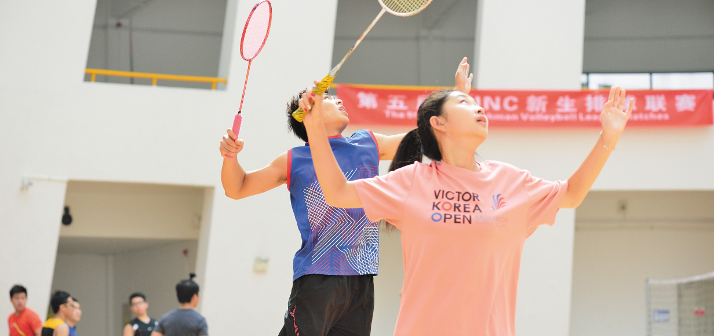Sports and Exercise Science

A first degree in sports science or a masters in sport and exercise science can lead to a diverse range of employment and postgraduate study opportunities.
We expect the majority of students to commit to careers in the sports and wellbeing sector undertaking roles such as:
- a sport scientist in educational institutions
- team analyst within professional and amateur sports clubs
- strength and conditioning coaching
- sport scientist within professional and amateur sports clubs or organisations
- fitness and wellbeing advisory work
- health screening
- research in sport science
Others may decide to look at jobs outside of science and enter a diverse range of roles ranging from law, finance, public relations, teaching, and charity work.
Spotlight On: Sports and Exercise Science
We invited four professionals to talk to you about their roles in sports and exercise science:
- Theo Bampouras, Researcher, Senior Lecturer, Coach and BASES Committee Member
- Joe Agu, Director of Nutrition Coaching
- Joe Payne, Sales Specialist within the NHS and private sector
- James Darling, Strength and Conditioning Coach
Login to SharePoint to watch a recording of this event
- Alumni: Email us to gain access to the webinar
What job vacancies are available?
These are just a few examples of job titles advertised recently.
- First Team Analyst
- Health Advisor
- Health and Wellbeing Coach
- Health Screening Specialist
- High Performance Sports Assistant
- Junior Physiologist
- Performance Sport and Fitness Officer
- Research Assistant – developing a home-based exercise programme and app
- Sports Scientist - professional football club academy
What are my further study options?
You may decide that a job on graduation is not for you and consider undertaking a masters or PhD in sport science.
For some PhDs a masters degree might be preferred.
Examples of PhDs
- Improving cardiometabolic health and driving performance in UK and Australian truck drivers
- Optimising the Parent-Coach Relationship in Youth Tennis
- 'Custom Made Compression Garments: A New Tool for Optimising Sporting Performance and Recovery'
- Measures of robustness in rugby union academy players
- Do dietary interventions aid in the recovery from physical activity and improve fatigue symptoms in people with Parkinson's (PwP) and is this due to altered substrate utilisation and improved mitochondrial functioning.
- PREHAB: Pre-operative Exercise Has Abundant Benefits: Evaluating the role of prehabilitation to improve surgical outcomes in patients with rheumatoid arthritis undergoing arthroplasty
- Towards a Vision of Clean Sport: Investigating anti-doping roles of Sport and Exercise Scientists
What are the skills employers look for?
To secure employment and remain employable you will need to develop a range of skills while at university. Skills you will have to develop in and outside of the curriculum include:
- communicating with people from diverse backgrounds and experience
- listening to people and interpreting what they say and feel
- working as part of a multidisciplinary team
- accuracy and attention to detail
- IT skills
- analysing and understanding data
- using pivot tables
- problem solving
- research and investigation
- time management
- planning
How can I enhance my employability skills during my studies?
Strength and conditioning
Strength and conditioning is prevalent within the sports sector and in particular professional sport. You might want to consider acquiring UKSCA accreditation – a professional standard of practice that employers use when employing and developing staff. UKSCA state that:
...having a degree does not make you exempt from completing the UKSCA’s accreditation process but of course the knowledge and skills you have obtained should support you in your assessment.
Topics they will include:
- foundation in strength and conditioning
- applied coaching science
- weight lifting for sport performance
- plyometrics
- agility and speed
- planning effective programmes
Current jobs at the time of writing included opportunities at:
- Manchester United
- Millfield School
- University of Strathclyde
- Scottish Gymnastics
- Surrey Sports Parks
UKSCA website
Coaching skills
You may also want to acquire coaching qualifications within a particular sport or acquire multi-sport coaching skills. is worth looking at for more information.
Alternatively, choose a sport and acquire specific coaching qualifications such as The Football Association coaching programme.
UK Coaching
Get involved in the community
Away from sport, you could be active in the community or student societies and make a positive contribution to the communities you live within.
Please be aware that study abroad, compulsory year abroad, optional placements/internships and integrated year in industry opportunities may change at any time for a number of reasons, including curriculum developments, changes to arrangements with partner universities or placement/industry hosts, travel restrictions or other circumstances outside of the university's control. Every effort will be made to update this information as quickly as possible should a change occur.
Explore more...
Listed below are some useful sites for you to look at to assess the current job market (including possible internships) and further study opportunities.